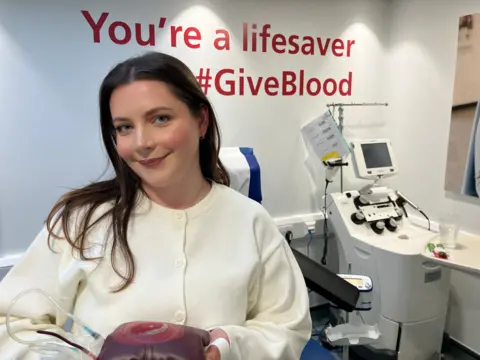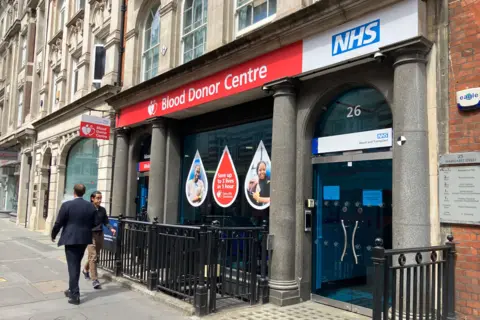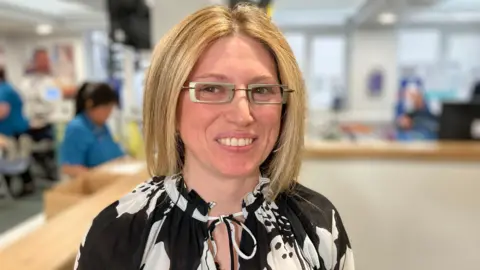'I'm a rare blood donor but it's not a superpower'
 BBC
BBC"I wouldn't say it's quite like a superpower but I do think it's amazing that something that you just happened to be born with can help so many people."
Speaking inside the busiest blood donation centre in Europe, Julia Gryn, from Thornton Heath in south London, has popped into donate after work.
The 27-year-old is just one of about 100 donors on the NHS Blood and Transplant's (NHSBT) Rare Donor Panel. Out of about 800,000 blood donors, those on the panel make up just 0.01%.
Speaking at London's West End Donor Centre on Margaret Street, she said: "I think it's really, really amazing that I can actually help someone with a genetic disorder."
She added: "It's crazy to think that a single blood donation can help to save up to three lives."

Julia's blood is rare because she lacks several of the most common antigens across multiple blood group systems.
Of the 350 known antigens, her unique combination does not include the K, M, S, Fya and Jkb, all of which are frequently found in the general population.
Her blood type is especially important for those with sickle cell, a genetic blood disorder whereby patients develop antibodies against several blood types making it harder to find matching blood.
Julia, who has donated blood since she was a teenager, was invited to join the Rare Donor Panel in May 2020, early in the Covid pandemic.
"At the time, I thought my blood was completely ordinary," she said.
On joining the panel, she said it felt different from her regular donations.
"It feels much more personal. I'm told when a specific patient needs a closely matched donation, and I book in around that. Knowing there's someone waiting who needs exactly what I can give makes the experience feel more direct and meaningful."
She added: "During my first donation, one of the team members told me that in their seven years working there, I was the first rare blood donor they'd encountered. That really stuck with me.
"Blood donation is an amazing thing - most people can do it, and it makes such a big difference."

Dr Chiara Vendramin, speciality doctor in donor medicine for the panel said donors like Julia were difficult to find.
"Julia is a very special donor. She has been amazing through the several years that she has been donating.
"Rare donors are very important and they play a crucial role in our organisation because they allow us to meet the really complex blood requirements that we have for specific patients.
"Most of the blood of these blood requirements are for those with sickle cell disease."
As for Julia, what would her message be to those worried about donating?
"I would say it's honestly not as scary as some people think.
"I do get some of my co-workers and friends asking 'how does it go, is the needle really big?' Honestly, you don't even pay attention to it, it goes so quickly.
"Everyone is always so kind and I would say it's a small thing that you can really do to help and save lives."
Listen to the best of BBC Radio London on Sounds and follow BBC London on Facebook, X and Instagram. Send your story ideas to [email protected]
